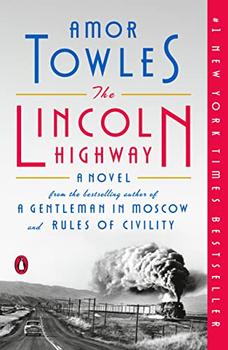Summary | Excerpt | Reading Guide | Reviews | Beyond the Book | Readalikes | Genres & Themes | Author Bio

A Novel
by Amor TowlesEmmett
June 12, 1954—The drive from Salina to Morgen was three hours, and for much of it, Emmett hadn't said a word. For the first sixty miles or so, Warden Williams had made an effort at friendly conversation. He had told a few stories about his childhood back East and asked a few questions about Emmett's on the farm. But this was the last they'd be together, and Emmett didn't see much sense in going into all of that now. So when they crossed the border from Kansas into Nebraska and the warden turned on the radio, Emmett stared out the window at the prairie, keeping his thoughts to himself.
When they were five miles south of town, Emmett pointed through the windshield.
—You take that next right. It'll be the white house about four miles down the road.
The warden slowed his car and took the turn. They drove past the McKusker place, then the Andersens' with its matching pair of large red barns. A few minutes later they could see Emmett's house standing beside a small grove of oak trees about thirty yards from the road. To Emmett, all the houses in this part of the country looked like they'd been dropped from the sky. The Watson house just looked like it'd had a rougher landing. The roof line sagged on either side of the chimney and the window frames were slanted just enough that half the windows wouldn't quite open and the other half wouldn't quite shut. In another moment, they'd be able to see how the paint had been shaken right off the clapboard. But when they got within a hundred feet of the driveway, the warden pulled to the side of the road.
—Emmett, he said, with his hands on the wheel, before we drive in there's something I'd like to say.
That Warden Williams had something to say didn't come as much of a surprise. When Emmett had first arrived at Salina, the warden was a Hoosier named Ackerly, who wasn't inclined to put into words a piece of advice that could be delivered more efficiently with a stick. But Warden Williams was a modern man with a master's degree and good intentions and a framed photograph of Franklin D. Roosevelt hanging behind his desk. He had notions that he'd gathered from books and experience, and he had plenty of words at his disposal to turn them into counsel.
—For some of the young men who come to Salina, he began, whatever series of events has brought them under our sphere of influence is just the beginning of a long journey through a life of trouble. They're boys who were never given much sense of right or wrong as children and who see little reason for learning it now. Whatever values or ambitions we try to instill in them will, in all likelihood, be cast aside the moment they walk out from under our gaze. Sadly, for these boys it is only a matter of time before they find themselves in the correctional facility at Topeka, or worse.
The warden turned to Emmett.
—What I'm getting at, Emmett, is that you are not one of them. We haven't known each other long, but from my time with you I can tell that that boy's death weighs heavily on your conscience. No one imagines what happened that night reflects either the spirit of malice or an expression of your character. It was the ugly side of chance. But as a civilized society, we ask that even those who have had an unintended hand in the misfortune of others pay some retribution. Of course, the payment of the retribution is in part to satisfy those who've suffered the brunt of the misfortune—like this boy's family. But we also require that it be paid for the benefit of the young man who was the agent of misfortune. So that by having the opportunity to pay his debt, he too can find some solace, some sense of atonement, and thus begin the process of renewal. Do you understand me, Emmett?
—I do, sir.
—I'm glad to hear it. I know you've got your brother to care for now and the immediate future may seem daunting; but you're a bright young man and you've got your whole life ahead of you. Having paid your debt in full, I just hope you'll make the most of your liberty.
Excerpted from The Lincoln Highway by Amor Towles. Copyright © 2021 by Amor Towles. All rights reserved. No part of this excerpt may be reproduced or reprinted without permission in writing from the publisher.
Believe those who are seeking the truth. Doubt those who find it.
Click Here to find out who said this, as well as discovering other famous literary quotes!
Your guide toexceptional books
BookBrowse seeks out and recommends the best in contemporary fiction and nonfiction—books that not only engage and entertain but also deepen our understanding of ourselves and the world around us.